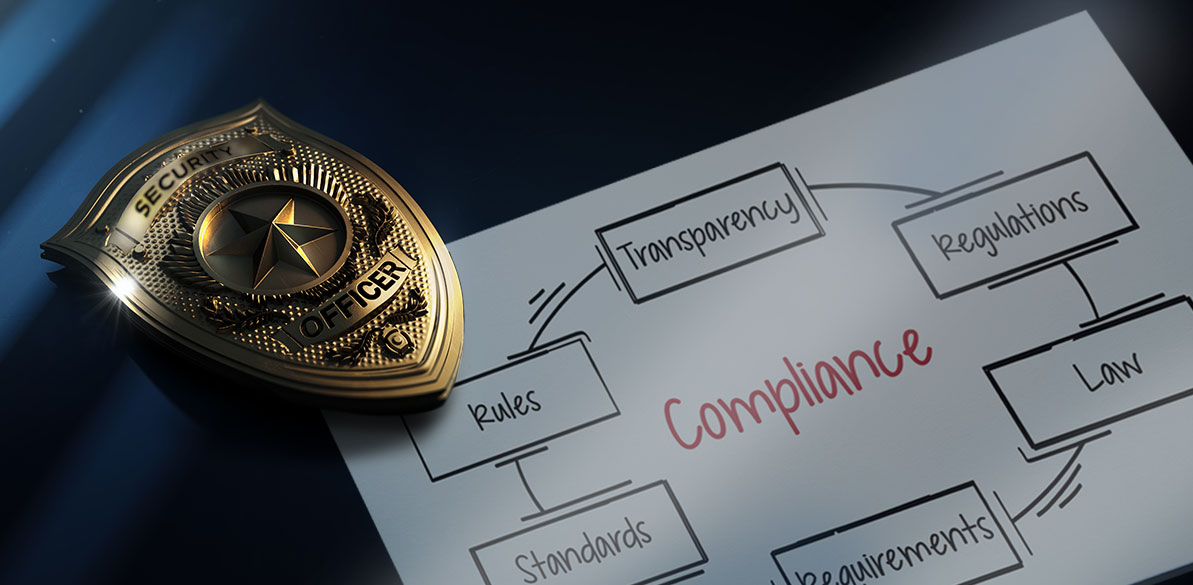Sooner or later, every contract security firm gets audited for compliance. It may be the result of a security-related incident involving your staff, or it may just be luck of the draw. In this article we outline various types of violations that could result in substantial fines and penalties.
What Constitutes a Security Guard Firm State Statute Violation?
Each state determines its own rules and standards for how contract security firms must operate, what is considered a violation, and the amounts of fines and penalties for disregarding the rules. Some states give their licensing authority wide latitude to adjust penalties based on the seriousness of the violation, if there is a history of previous violations, or whether or not the respondent has indicated a willingness to correct the violation. (See our article on the cost of non-compliance for a list of fine amounts in the ten states for which Defencify is currently certified to provide remote security officer training).
There are all kinds of inappropriate behaviors and actions that can result in a violation, and while there are a few that are quite specific to a state, most can be applied across multiple jurisdictions.
For example, did you know that in Texas it is a violation for a person who has been convicted of a charge of cruelty to animals to work with dogs as a canine security officer? Yet in nearly every state, failure to carry and present a Guard Card upon request to a state inspector is a violation punishable by monetary fine.
Examples of State Statute Violation
The following list has been compiled from multiple sources including the Security Personnel Licensing Act Contract Security Rule published by the Department of Commerce in Utah, Defencify’s home state, as well as the California Bureau of Security and Investigative Services (BSIS) Code of Regulations, and the Texas DPS Private Security Statutes and Rules.
Note: Some of the language describing code violations has been genericized to allow this article to apply to multiple states. Security firm HR personnel and applicants are encouraged to consult the statutes for specific parameters of what constitutes a violation for security guards in their state of employment.
- Security guards must carry their license on their person at all times and be ready to present it to inspectors on demand. A lost Guard Card must be reported and a request for replacement made within 72 hours.
- Knowingly or unknowingly employing an unlicensed security officer or one whose license has expired.
- Failure of a security officer to comply with continuing education requirements for license renewal.
- Failure of the firm to notify the state licensing authority within 72 hours of receiving notification, or becoming aware, of any arrest, charge, indictment, or conviction of any of its licensed security officers.
- Failure of the firm to submit an incident report to the state licensing authority within 24 hours of a physical altercation, discharge of a firearm, or the use of a deadly weapon by an officer while on duty. In California, the time period is seven (7) days.
- Carrying or using a firearm while not being in possession of a valid firearms license.
- Being found on duty under the effects of drugs or alcohol.
- Inappropriate use of force or unprofessional conduct toward a member of the public.
- Failure of the firm to have adequate general liability insurance as determined by each state’s minimum coverage requirements.
- Failure of the firm to notify the state licensing authority of any member of the public that required first aid or medical attention as the result of physical use of force by a guard on duty.
- Failure of the firm to properly maintain accurate and current personnel records of each employee, including the date of termination of employment.
- Making any statement that would lead a reasonable person to believe that a private security guard functions as a local, state, or federal law enforcement officer.
- Wearing a uniform, insignia, or badge that would falsely lead a reasonable person to believe that a private security guard is connected with a local, state, or federal law enforcement agency.
- Utilizing a vehicle with markings/colors, emergency lighting, and/or signal devices that imply or suggest that the vehicle is an authorized law enforcement vehicle. Using unmarked vehicles for security patrols can also be a violation.
- Failing as a contract security company to adequately supervise employees so as to place the public health and safety at risk.
- Failure of the firm to report a known criminal offense to local authorities.
- Failure of the firm to notify the state licensing authority when a firearms instructor ceases to work for the firm or falls out of compliance with continuing education requirements and can no longer serve as an instructor.
Any one of these actions – and dozens more like them – can result in citations and heavy fines being levied against your firm. Even if the violation is due to an individual officer’s actions beyond your control, you are ultimately responsible as they represent your company.
Educating your workforce about what constitutes a security violation and how to avoid them is a good first step; perhaps make a poster of Do’s and Don’ts for your office wall. For some more tips on how to best approach a security audit and limit your exposure to fines and penalties for state statute violations, download our free whitepaper and visit us at www.defencifytraining.com.
